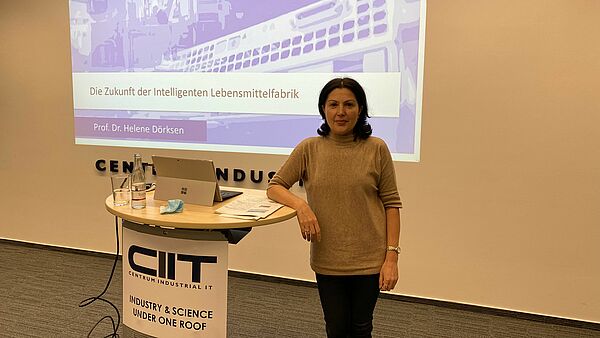Digitalization and Industry 4.0 are increasingly finding their way into a wide variety of economic industries and sectors. The food industry is no exception. But what might a smart factory in the food industry look like in the future? And what possibilities does data intelligence promise?
These questions were addressed by Professor Helene Dörksen from the Institute for Industrial Information Technology at TH OWL at the Solutions event "Die Zukunft der intelligenten Lebensmittelfabrik" on November 9. Solutions is the OWL forum for technology and innovation. Companies, research institutions and business-related organizations discuss new developments around the digital and ecological transformation and carry them into practice.
The future vision for a smart food factory is currently being built at the Innovation Campus Lemgo. The Smart FOODFACTORY is a research and demonstration platform for digital transformation in food technology, where new technologies, products and production processes in the food industry are jointly developed and evaluated. To make the factory smart, various mathematical and data-based approaches will be integrated. "In the future, we want to equip machines and products with sensors and data intelligence. This will enable us to check at an early stage whether, for example, a plant will need maintenance soon or the food has certain quality restrictions. Different scenarios of a food production plant allow a digital image to be created and thus statements can be made earlier or conclusions drawn about real problems. This saves time and money and is more sustainable," says Prof. Dörksen, describing the vision.
For example, imaging approaches for food are reaching their limits. Multivariable data analysis can still be used to a limited extent because the necessary methods are not yet fully developed.
Foodstuffs are already a highly variable product in terms of their raw materials, and special hygiene and quality requirements are needed. "We cannot simply transfer existing and successful approaches from the intelligent industry, in which artificial intelligence or the digital twin are used, for example, one-to-one to the food industry. We are still in our infancy in this area," concludes Prof. Dörksen. In the future, the Smart FOODFACTORY will be a supraregional driving force for innovations at the highest technical level.
The Smart FOODFACTORY is funded by EFRE, the European Regional Development Fund, and has a total volume of around 10 million euros.



